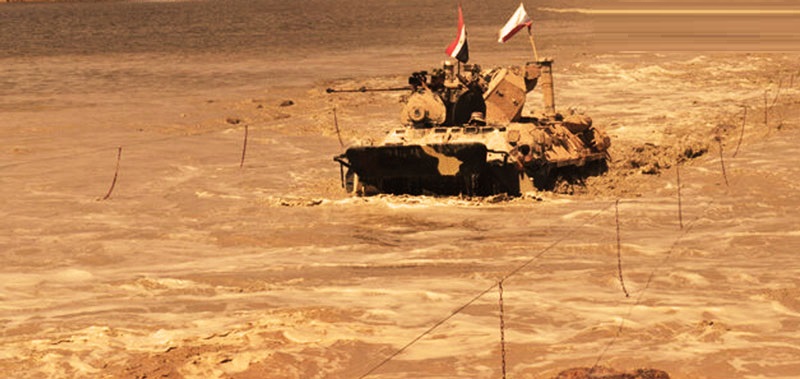The war, also called Ramadan or Yum Kippur War, took place ctober 6-25, 1973, was between the Israeli regime and a Syrian-Egyptian alliance. The October war was exceptional and the Arab states had planned to reverse their defeats in the previous wars. In surprise moves, they attacked Bar Lev Line fortifications in south of Suez Canal and also the occupied Syrian Golan Heights, recapturing hefty chunks of lands they lost in 1967 war. According to the treaty that followed battle, Syria’s Qunitera and parts of Golan Heights as well as Egypt’s Sinail Peninsula, were liberated. This war, the last in a series of Arab-Israeli confrontations, marked the first major victory for Arabs. It was for this reason that since then, the Israelis never dared to wage a new major war on the Arabs and only sought to keep the territories they seized in previous wars.
The Israeli casualties in October war were considerable and Tel Aviv admitted this after five decades. The Israeli foreign ministry issued a statement on the anniversary of the war, saying that the 1973 attack was surprising and Israel paid a heavy price for it. The statement continued that Tel Aviv had no enough time to prepare its reservists and lost 2,688 soldiers and 150 tanks. Haatetz newspaper revealed documents of the Israeli chief of general staff in 1973 it accessed recently. The documents portrayed the Israeli military’s state of disappointment during the war. Therefore, the large-scale Syrian military drills on the anniversary of this historic war carry important messages for the enemies.
Aimed at the Israeli regime
Although the Syrian government along with Russia and its allies in the
Axis of Resistance has already conducted several military exercises, the
recent one, which was purely Syrian and massive, carries highly
significant points. It carries warnings to Tel Aviv as it comes on the
war anniversary and because the Israeli regime over the past year has
launched attacks on various Syrian regions. It tells the Israelis that
Syria is no longer a war-waged country and incapable of responding to
the Israeli crimes because of engagement in anti-terror fighting. The
Syrian military has manged to intercept many of Israeli missiles coming
to its territory but it refrained from a direct confrontation with the
Israeli forces for some considerations. Now that Damascus has largely
gotten rid of the crisis stirred by the West and its regional allies, it
strengthened its military power, broke out of its defensive gesture and
is embracing an offensive one.
By holding the major military drills at a time the international
atmosphere is tense due to the Western-Russian face-off in Ukraine, the
Syrian President Bashar al-Assad and the military try to send a message
to the Israelis that if they make a mistake they will be thought an
unforgettable lesson. With the Russian and Israeli relations chilly over
Ukraine war, Syria has resolute Russian and Iranian support against the
Israeli regime and can foist heavy losses on it in case of a direct
confrontation. Also, the Israeli military occupies Golan Heights and the
Syrian military tries to take back this part of the country. With the
boost of Syrian power, liberation of Golan Heights is not unlikely and
actually a matter of time.
Tel Aviv leaders have repeatedly tried to hold a referendum in Golan
Heights and annex it forever but their plans are challenged by
international objection. The Israeli repeated defeats in wars it waged
against the Palestinian factions whose arms are incomparabe to those of
the Israeli military are emboldening the Syrian government to secure a
victory against the Israelis amid Damascus shift from defensive to
offensive approach. If clashes break out between Tel Aviv and Damascus,
due to the Ukraine war conditions, the West is not is a proper situation
to help the Israelis. In other words, everything is now in Syria’s
favor.
The Syrian military drills are investigable from another aspect. Turkish
forces entered Syrian territories as Syrian government was busy
fighting a litany of foreign-backed terrorist groups, and now that
Damascus left behind the critical war conditions, it can force the
occupying forces out without any obsession. Although in recent months
Turkish leaders showed an interest to normalize with Damascus and took
steps towards showing their good will, their forces are viewed as
occupiers by Syria which several times calle for their withdrawal but
Ankara has so far turned a deaf ear and continued its adventures.
Therfore, the recent military exercises are a serious warning to the
Turks to leave Syrian territory as soon as possible because the Syrian
forces do not sit on their hands and watch their territory occupied by
another country.
Having in mind that the international developments have shaped the
conditions in a way that any military action by regional and world
powers is likely, the Syrian forces may take a strong stance against the
American occupation, too. The American forces are stationed in Syria as
they have been sure Damascus will not focus on their occupation for its
obsession with internal war. They have already benefited millions of
dollars from plundering the Syria oil reserves. But a strong Syrian army
and government make a difference, and perhaps the Americans decide to
flee Syria as they did disgracefully in Afghanistan. Their withdrawal
from Syria can also be driven by new Russian doctrine in opposition to
the American policies in the region. Odds are the American leaders
decide to pull out their forces to steer clear of further tensions with
Moscow.
Despite a heavy push by the Western-Arab-Israeli camp to overthrow the
Syrian government, President Bashar al-Assad and his military are now in
a position of power and with their massive military drills they warned
that from now on any military adventures in the Syrian territory bear
irreparable consequences and they should consider all aspects before any
action.
/129

